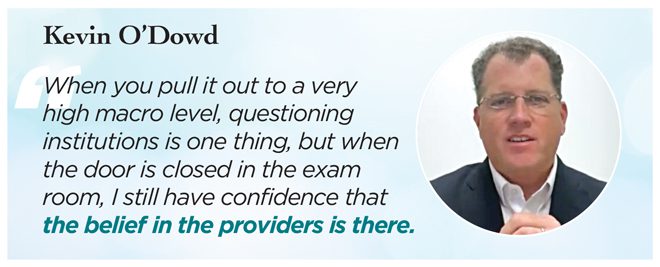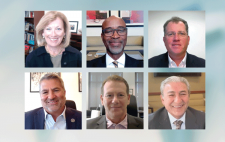Over the past 4 years, our local hospitals have faced a healthcare landscape they’ve never seen before. No one has. It’s filled with devastating illness, skyrocketing costs and a section of the population that questions and misinforms. And yet, the CEOs leading South Jersey health systems will tell you their mission guides them and keeps them strong. There is a lot of work left to do, and no matter the challenges, they’ll keep moving forward.
Participants:
Amy Mansue President/CEO, Inspira Health
Aaron Chang President, Jefferson Health – East
Kevin O’Dowd Co-President/CEO, Cooper University Health Care
Al Maghazehe President/CEO, Capital Health
Dennis Pullin President/CEO, Virtua Health
How Covid still affects their business
Covid’s long-term effect continues to concern me, in reference to how we protect our communities. I still have concerns about the trepidation people have about coming in for care. We’re still seeing people who say, “I know you guys are busy, so I’m going to wait to come in.” So they come into the Emergency Dept. presenting much sicker than they did pre-Covid.
Amy Mansue
Coming out of the Covid disruption, over the last four years, we’ve seen 20% inflation. That’s normally what you see in a decade. We don’t have the ability to raise prices like a supermarket can. We have long-term managed care agreements that don’t recognize the price increases. We have government payers who have not given us corresponding adjustments to our rates, so we’re still sort of operating from pre-Covid levels of how we’re reimbursed, but our costs are up across the board.
Kevin O’Dowd
The impact is certainly not like it was a few years ago. Our Covid patients currently make up about 3-4% of our inpatient census, which is significantly lower than what we were seeing at the height of the pandemic. We’ve been able to care for these patients and not experience anywhere near the capacity or resource restraints that we felt during those times.
Aaron Chang
Covid’s impact is not going away anytime soon. When Covid hit, we always had a lot of patients. Our ICUs were packed, and you couldn’t have any elective cases come in. That was a huge, huge impact, financially speaking. If you look at our expenses since then, line by line, everything is up, 15-20%. It’s the same experience you have in grocery shops. But when our costs are higher by 15-20%, you get a 2.9% increase from Medicare. Obviously, you have a significant shortfall.
Al Maghazehe
We learned during Covid how to accelerate many of our activities – things we had strategically planned that may have taken a year or two, we learned how to do it at an accelerated pace. Now we go into our strategic activities with that mindset, that we can be a little more purposeful and not take forever and a day to do things. So from a positive perspective, that’s one of the things we have carried from Covid.
Dennis Pullin
One social issue they’re trying to address
People are really suffering, especially if they are living in inner cities. People need help and people need hope. So we put together the Trenton Neighborhood Initiative. 29 families now own homes since we started this program. We give them a down payment, and we help them with their mortgage. We have given away thousands of bags of groceries. And we’ve put together a training program for young people in surgical tech, EMTs – and it’s all tuition free. We’re paying them because we found out they get too far off track when they don’t have money. So we pay them to go to school, and then we hire them.
Al Maghazehe
We continue to see food as medicine, so we’re addressing food insecurity in South Jersey through our Eat Well program. We have a mobile grocery store and mobile farmers market, which allows us to address the one thing none of us should ever have to deal with and that is concern about where our next meal is coming from.
Dennis Pullin
Throughout the industry, and especially here in South Jersey, violence occurs in our community and rolls in our doors. Every single person within the organization has been trained on how to de-escalate behavior when people are inside the house. We have a workplace violence team. We have a social worker embedded with our police department. It’s a huge issue that we’re addressing.
Amy Mansue
One issue we have addressed is the education gap that has existed in our host city of Camden for some time. Ten or 12 years ago, the public education system in Camden had some of the lowest scores in the United States. Cooper has engaged in the form of sponsoring schools, from a monetary perspective, volunteering time, tutoring, classroom appearances and really focusing on helping to close that education gap. There was a study that came out within the last couple of weeks showing that over that 10- to 12-year period, the Camden School District has seen the largest improvement relative to standardized test scores throughout the entire United States. They’ve closed the gap by over 50%. We’re proud to have played a role in driving change around that issue.
Kevin O’Dowd
One key focus for us is language. Patients with limited English proficiency are among the most vulnerable population. Miscommunication can severely impact how one manages their healthcare. We utilize a medical translation and healthcare interpreting platform called Globo. We have interpreting and translation services for over 430 languages. We’ve recently been designated a grant from the U.S. Department of Health and Human Services to reduce risk for readmission by optimizing and improving language access. Because of the grant, we’re able to offer training to those who want to be certified medical interpreters.
Aaron Chang
 New technology in their hospitals
New technology in their hospitals
We have a new technology through our MD Anderson Cancer Center at Cooper called histotripsy. Only 19 organizations in the country have it. It’s FDA approved, and with respect to liver cancer, it uses sound waves to destroy the tumor for patients who have little to no options. So far, this new technology has brought about incredible results, so we’re excited to offer that.
Kevin O’Dowd
Robotics, robotics, robotics. We started the Center of Excellence in robotics a few years ago. We use robotics in every way, and we have all kinds of robots – and what is coming in AI is going to affect the robots. It’s much more precise, so you have better outcomes, and patients spend less time in the hospital. The future of healthcare is all about technology, and that will be excellent for patients. Productivity is going to go through the roof. And on top of that, we’re going to perform consistently each and every time.
Al Maghazehe
We are investing heavily in smart hospital rooms. We’re incorporating technology that includes a two-way platform for video conferencing, so we can now have what we call the virtual nurse to help explain a patient’s medication or a virtual physician that could check on a patient overnight. This technology is not meant to replace in-person care, but to augment it. For instance, it allows the virtual nurse to take on more of the administrative tasks, allowing that in-person nurse to expand their bandwidth to administer hands-on direct care. It’s a great way that technology can help the overall patient experience. Our hope is that, in a very short time, all hospital rooms at all five of our hospitals will be smart rooms.
Dennis Pullin
I’m excited about AI-driven areas in the clinical space. We have algorithms that have been developed to match a patient’s previous history with their current symptoms to identify, as an example, if they have sepsis and need to be treated within a very limited period of time. This new technology is going to allow us to support our clinical teams in ways we haven’t seen before. It helps patient care. I’m most excited about technology on the horizon that we haven’t even thought of yet.
Amy Mansue
Amy mentioned sepsis, which is a clinical syndrome that impacts at least 1.7 million people each year, and 350,000 people die from that. We’ve employed smart intelligence through our electronic medical system to ID and flag those who have risk factors to develop sepsis. So when an individual comes in who may be at risk, we’ll have actual notifications saying this is an individual we need to look out for. And there will be care plans rolled out for that. Having technology that supplements the work of the people who are delivering the care has been tremendous. They’re able to implement appropriate, timely care plans that keep folks healthy.
Aaron Chang
 When people question medical science
When people question medical science
People have the right to question medical science, and they should be curious about the research and medical advances. Being an academic healthcare system, we strongly believe in research and believe it’s essential for patients to be informed. We’re in an information-rich age, which is fantastic in many ways, but the challenge that it presents is patients need to sift through fact versus fiction. We recognize that it’s our responsibility to educate and dispel misinformation that can lead to the anxiety that will influence healthcare decisions. When a person understands the how’s and the why’s, it moves them from a place of disbelief to a mode of exploration, which could ultimately result in change.
Aaron Chang
I’m going to give you one example – diabetes. People used to check their blood and glucose level by constantly getting blood out of their finger. What happens over time? Your skin gets thicker. You have scar tissue under your skin, and now blood doesn’t come out, and it’s very painful. Today, you have a pump attached to your skin and you can use your iPhone to look at your glucose level every second. If you need more insulin, you simply put it in your phone and that’s what the pump does for you. The way that has improved – that’s science.
Al Maghazehe
The challenge is there’s so much information on the web that people see the worst and they diagnose themselves. I can’t tell you how many times I’ve said to a family member, “Last time I checked you didn’t have a medical degree. Trust the people who have gone through those programs and listen to what they say.” At the end of the day, you make the decisions, but making those decisions before you come in and speak with a provider is a frightening place to be.
Amy Mansue
It is concerning that someone may be more inclined to believe an unverified post on Facebook than somebody who has spent years researching or educating themselves. If you were to see any of our advertisements, there’s a piece that talks about us wanting to be a trusted partner in the healthcare journey. We also try to get people to see that the people who care for them are members of their very own community. These are people you know, people you worship with, people you go to sporting events with. You can trust those individuals who you’re counting on to have a meaningful impact to your care.
Dennis Pullin
Over the last 10-15 years, we’ve seen trust erode in many institutions – government, media, science. I’m still confident that when a patient is having a conversation with a provider, they are going to trust the advice that’s being given to them. When you pull it out to a very high macro level, questioning institutions is one thing, but when the door is closed in the exam room, I still have confidence that the belief in the providers is there. At the individual level, that questioning is not as prevalent as it is at the macro level.
Kevin O’Dowd
 One thing they’re especially proud of
One thing they’re especially proud of
There’s been a lot written about the investments we’re making in rebuilding our campus, but if I had to narrow it down to one thing, it’s our partnership with the MD Anderson Cancer Center, and now we’re 11 years into having that relationship. The ability to bring the highest quality of cancer care to the region is just something I will always be incredibly proud to be a part of.
Kevin O’Dowd
I’m a true believer in high reliability organizations. What that means is Jefferson is strongly committed to excellence in patient safety, which means we foster a culture of continuous process improvement and active engagement from our staff. Our quality programs are second to none, and the empowerment we’ve given to our employees through the implementation of things such as the employee advisory group, has really been a pleasure to see.
Aaron Chang
I’m most proud of the continued growth of all our teaching programs. South Jersey suffers from a lack of providers in Cumberland and Salem Counties, where our facilities are. We’ve made a committed effort to say, let’s not just teach them, let’s help them fall in love with us so they will stay here. And when I say here, I mean all of South Jersey. We think if we prioritize medical school applications for students who grew up here, the chances of them staying here and continuing to practice are significant. We’ve been able to grow our program to now almost 300 residents, one of the largest community teaching hospitals in the state, and we’re very proud of that.
Amy Mansue
The most important thing I’m proud of is that Capital Health has actually done something about social detriments of health. I want our Trenton Neighborhood Initiative to be the most comprehensive community resource available to the people of Trenton. Whether a person has a banking problem, a credit problem, a housing problem, a health problem, an education issue, no matter what their problem is, they can go there for assistance. This is not about money. It’s about helping people to live better.
Al Maghazehe
One of the things I’m most proud of is the creation of Oliver station. Oliver station is a partnership with the Michaels Organization, in which we are building 46 affordable homes in Camden, homes that will provide an opportunity to create communities of wellness, providing people with stable, affordable homes. It’s our way of also addressing some of the challenges that many of our patients face with homelessness.
Dennis Pullin
The inequities of healthcare
Salem City is one of the poorest cities in the state, and it has the worst health outcomes. People can’t get to the hospital unless they’re in an emergency situation, and the level of care they need is not available at times because there are so few providers. We’ve been doing a lot of advocacy with the Camden Coalition to find how we take those lessons that are learned in dense areas and apply them to rural areas. We’ve done it with maternal-child health. And we’ve provided transportation through Uber to get people to appointments. We’re fighting to make sure patients get the care they need.
Amy Mansue
Health disparities are real, and each of us has to take ownership as community leaders to address it. One way we’re addressing some of the inequities is a program in Camden we call Healthy Neighbors. We are addressing individuals with two disease states: hypertension and Type 2 diabetes. We’re building programs to help address things such as food, housing, trouble paying bills, and we connect people to third party services to help alleviate some of the social determinants of health, so they can focus on their primary health concerns.
Dennis Pullin
Our Black and Hispanic residents die from preventable causes at rates that are significantly higher than their white and Asian counterparts here in New Jersey. In areas that are underserved, transportation is the number one thing that limits individuals from getting access to these resources. So the fact that Jefferson is able to go out there with mobile vans and a group of clinicians who really interface with these folks – and mind you, folks of their cultural and ethnic backgrounds – has been a significant boost for those areas we serve.
Aaron Chang
For many of the folks who will listen to or read this interview, they may jump in a car and drive to an appointment 20 minutes from their house. But in Camden city, where less than 10% of the residents have a car, that creates a barrier to access. One area we’re focusing on is expanding access at the community level. The second thing is really trying to study, in an open and transparent way, some of these disparities of care. Why is it that an African American man may have a different set of tests offered to him versus a white man? We want to analyze root causes, and then be open and transparent publishing that. The only way we’re going to make change is if we’re transparent about what we’re finding.
Kevin O’Dowd
We have to do more for people who don’t have access to care. You cannot just look at colors. You cannot say this person is worse – everyone is the same. It doesn’t matter where you came from, who you are, what you’re doing. People are people. God gave us the same body, the same brain, same anatomy, it’s all the same. If we take care of everyone the same way, society is going to improve. Communities are going to function better. There will be hope.
Al Maghazehe
Why someone should work at their organization
If I had to pick one thing, it would be our commitment to diversity, inclusion and equity. We want our employees to feel seen and valued as unique individuals. And that comes across as a result of what we call our “Culture of We.” We have a number of colleague communities, or affinity groups – from Women of Virtua to a group for the LGBTQ community, a group for veterans, a group for colleagues with disabilities. It is clear that we value the people who are called to be part of this wonderful field that we all get to work in.
Dennis Pullin
Someone should consider a career in healthcare if they’re looking to work for an organization that has a sense of purpose. There are a lot of positions in healthcare organizations where you could serve that function at another non-healthcare institution, but I would submit to you that you won’t have the same sense of purpose. We’re all not-for-profit entities that are principally designed to serve others, and that’s a differentiating factor. If you’re considering the next step in your career, think about the institution you’re about to align with. We all have a sense of purpose that’s meaningful and that delivers satisfaction in a way that maybe another institution in another sector can’t really provide.
Kevin O’Dowd
If you’re interested in getting involved here, look at how fast we’re growing. Since I started here as CEO, we went from 800 employees to 6,000 employees. We went from 30 doctors to 600 doctors. You don’t work for a place that’s shrinking, you work for a place that’s growing.
Al Maghazehe
We also spend a lot of time talking about our team’s mental health and wellbeing. We need to make sure everyone is taking care of themselves. We have lots of hard conversations about that. We have a peer-to-peer support program where if you’re in crisis, we can send a team out. Or if you’re not in crisis, and you just need to talk to somebody, your peers are there. All of that makes a huge difference. But at the end of the day, being in healthcare in any way, whether you’re a direct clinician or whether you’re working in the billing office, is a tremendous gift and something we all hold very dear.
Amy Mansue
Three reasons: First, I truly believe we’re an organization that lives out our mission. Everything we do is for the betterment of the communities we serve. Second, we’re an organization that has a cohesive, integrated delivery model, and that allows you to take care of someone from A to Z. And then lastly, the culture and environment – we really take care of our own. When you join our team, you’re family.
Aaron Chang
Balancing mission & money
This is a struggle we all are faced with. Making choices on the business side of healthcare is a critical piece to ensuring that our institutions will be there for our communities. We’re not-for-profit corporations. We don’t have stockholders. Our mission is not to make money, it’s to make just enough money so we can continue to invest in new technologies, continue to recruit the best and brightest, continue to provide that top level of healthcare our South Jersey community has come to expect and deserves.
Kevin O’Dowd
We always keep the patient at the center of everything we do. As long as everybody at the table realizes we’re always going back to that, we ultimately end up in a place that allows us to proceed. When you’re in a seat like ours, you always have to be at 30,000-feet, but at times, you get into the granular details to remind team members, “Hey, did we think about the patient impact here?” That’s been a guiding light for me.
Aaron Chang
It boils down to three simple words we use at Virtua a lot: Here for good. As a not-for-profit health system, we have to be mindful of two needs. First, we have to look at the future and position ourselves for financial stability and strategic impact, and we have to think about 10 years down the road, not just today. The second is all about our mission and the compassion that’s required to be in healthcare. I tell people we have two bottom lines: One is to do good, and one is to do well. Doing well is about being good stewards of our financial resources, and doing good is making sure that we do what’s right for our community.
Dennis Pullin
Our mission is why we’re here, but I have to make money to be able to finance it. So you create that balance. You do a great job in terms of making sure you get paid adequately and you stay focused on your mission. That’s how you make it all work.
Al Maghazehe
The way you find that balance is to always go back to, “How do I take care of the people in the community?” You bring the community along in that process, and you make sure you are transparent about what you’re doing and why you’re doing it. We have to make some difficult decisions, and we’ll continue to do so, because the people in our communities need us to.
Amy Mansue
What their job has taught them about life
It’s critical to be mindful, to be intentional and to act with purpose and conviction.
Dennis Pullin
There are times you need to figure out a way to continue to smile and laugh and find the good.
Amy Mansue
If you work hard, if you’re honest, this country will give you the chance. I’m an immigrant. I came from nothing, and this country gave me everything I have.
Al Maghazehe
I’ve learned to keep things in perspective.
Kevin O’Dowd
I’ve learned about the power and beauty of teamwork. Great things come about when we unite to work on a common cause.
Aaron Chang
Watch videos from our Hospital CEO Roundtable


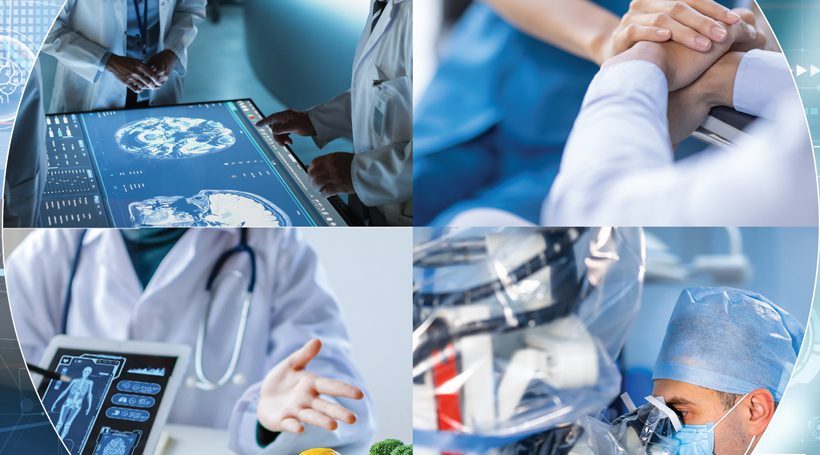
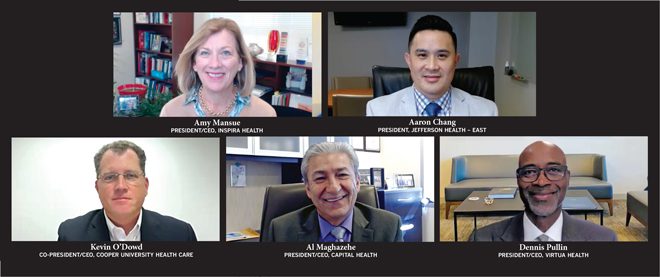
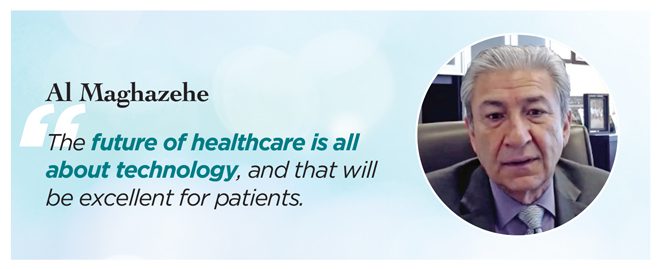
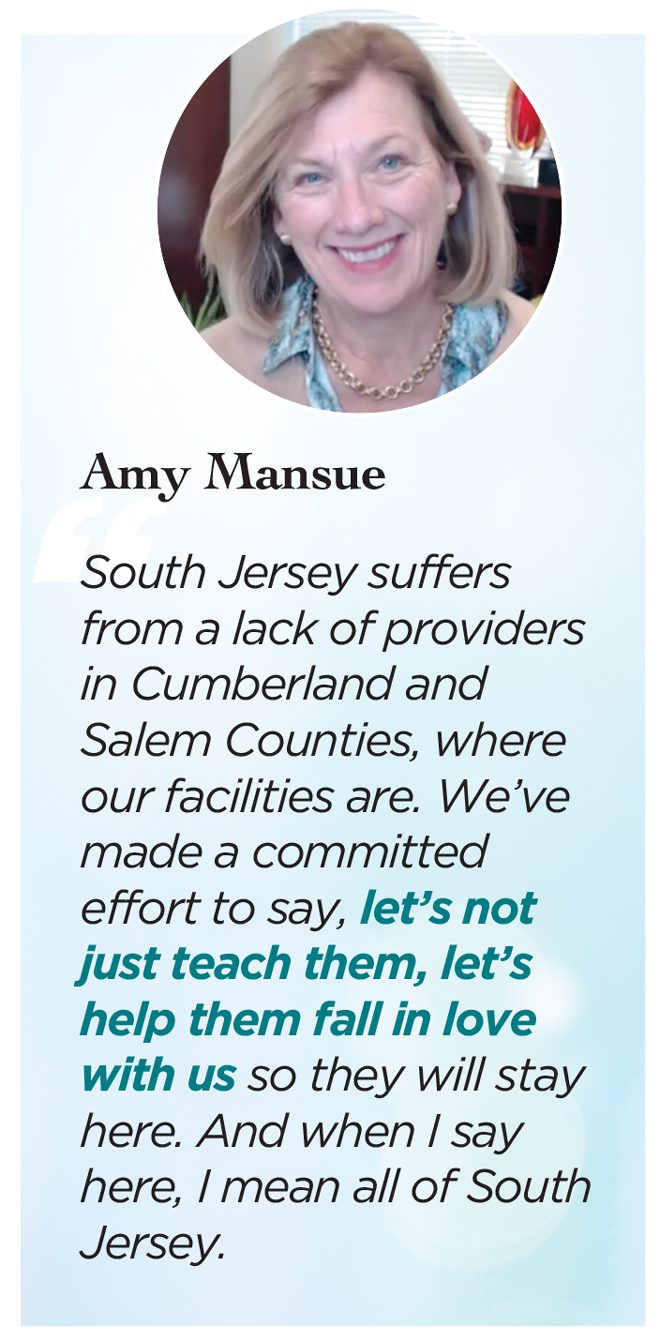 New technology in their hospitals
New technology in their hospitals When people question medical science
When people question medical science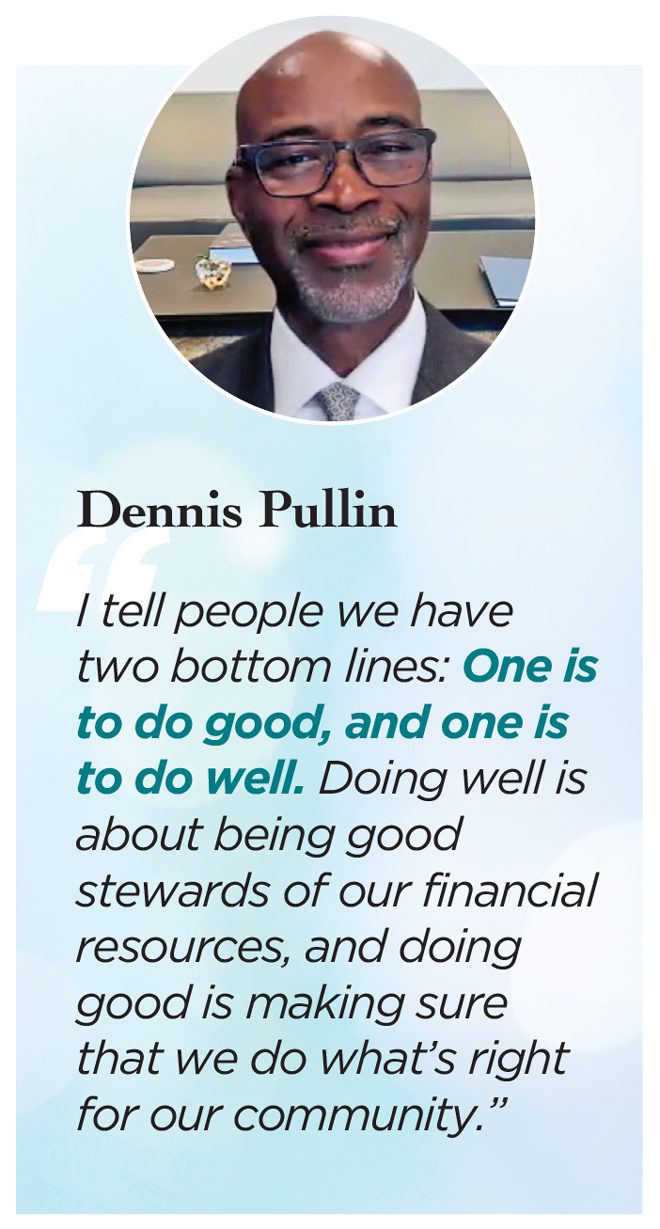 One thing they’re especially proud of
One thing they’re especially proud of